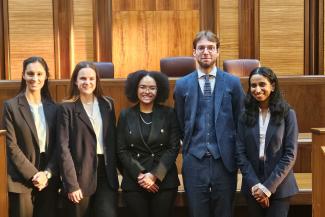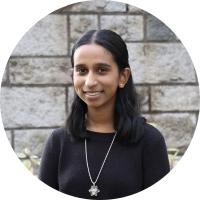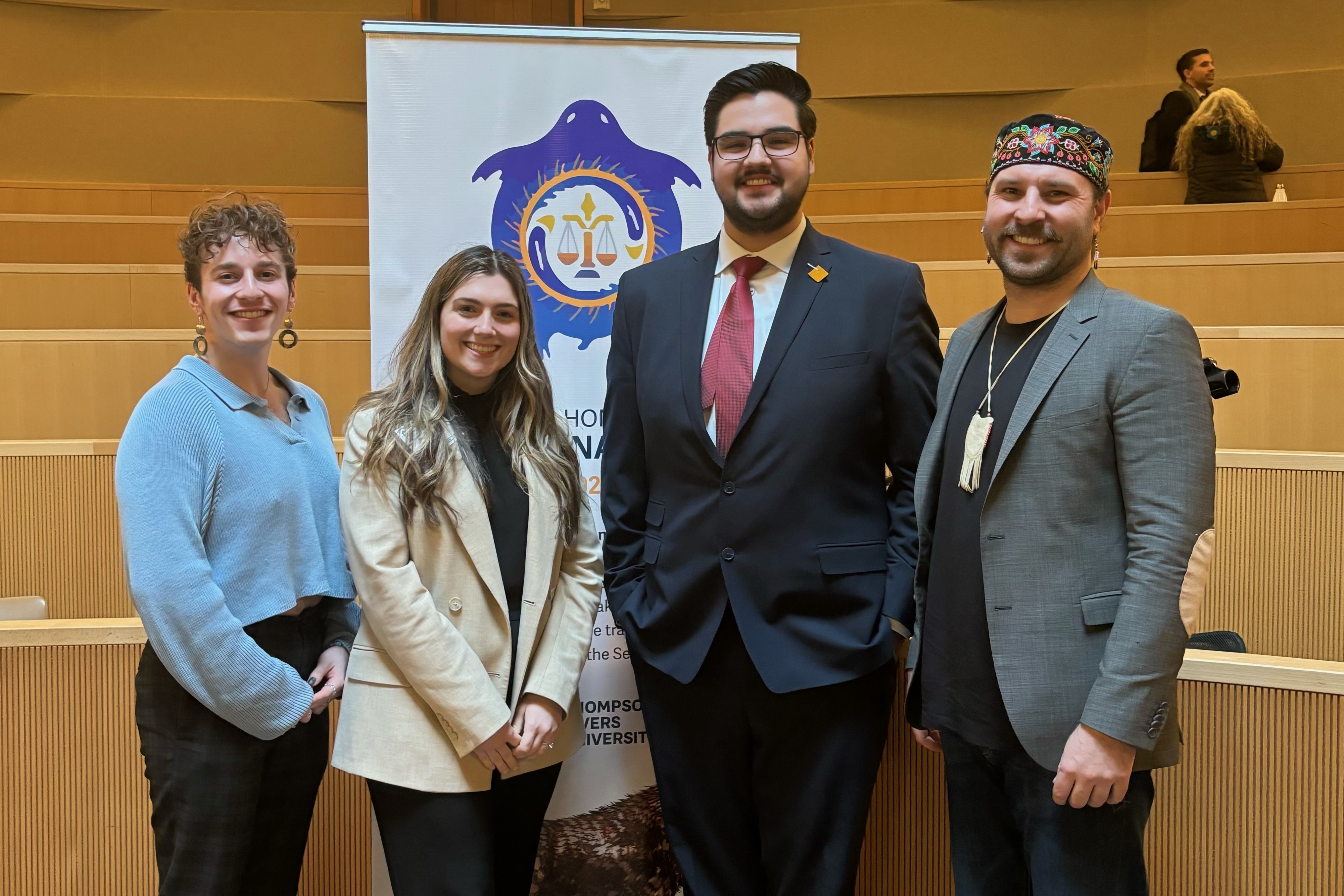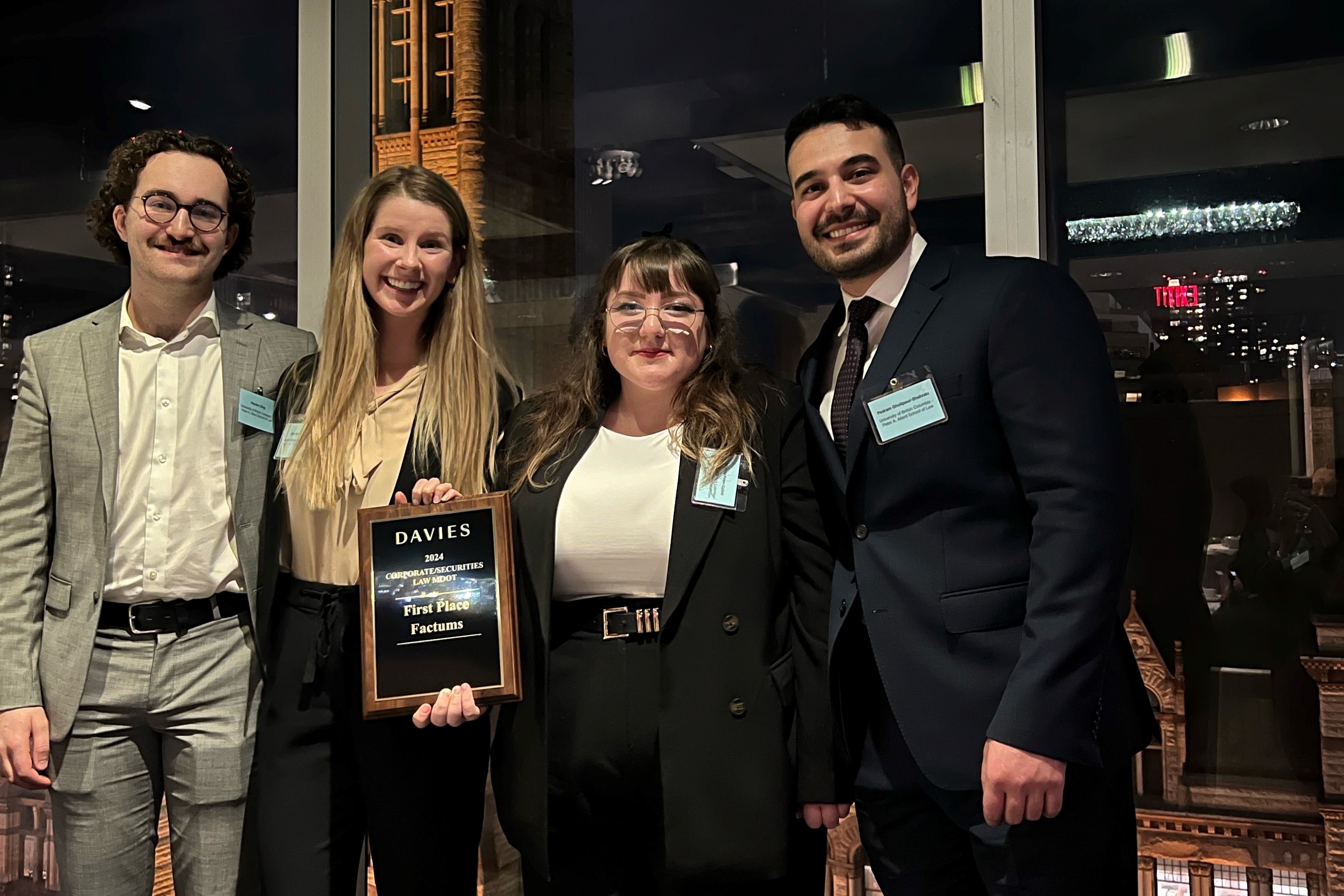This year, Allard Law students travelled across Canada and the United States to participate in twelve different upper-year moots.
Moots, which are simulated court proceedings, give law students an opportunity to work together to hone their skills as advocates. To prepare, students spend months practicing with their teammates and coaches and developing their arguments. We’re incredibly proud of all our student mooters for all they learned and accomplished.
We spoke with three Allard Law students who participated this past year in our upper-year moots to find out what they took away from the experience.
Philip C. Jessup International Law Moot Court Competition – Ananya Aravindan

The Philip C. Jessup International Law Moot Court Competition is the world's largest moot court competition. Each year, participants from around 700 law schools in 100 countries and jurisdictions around the world come together to take sides in a fictional dispute between nations before the International Court of Justice.
Allard Law’s Jessup team – Ananya Aravindan, Kevin Doering, Shanice Harris, Madison McBlain and Jaya Scott – first competed in Ottawa before moving on to the International Rounds in Washington, DC. Allard Law's team was sponsored by Fasken.
“I enjoyed the chance to learn about international law and developments in that area,” says Ananya. “We also got to meet law students from all across the world and learn about all the different ways to get involved in international law. It was definitely a once in a lifetime experience.”
What impact do you think mooting had for you on other aspects of law school?

Ananya: The moot helped me improve my research skills and my issue-spotting skills. Through discussions with the team and our coaches, we would think about new ways to approach our problem from new angles. In answering the judges’ questions, I got better at thinking on my feet and adapting my arguments as needed. You also get the chance to get detailed feedback on your oral argument skills from lawyers and judges, which is an invaluable experience.
What would you say to a student who’s thinking about mooting?
Ananya: If anyone is even considering trying out for an upper-year moot, I would highly recommend it! It's a great chance to develop your oral advocacy and research skills and to meet law students from other schools. If oral advocacy is something you're not very comfortable with, the upper-year moots are also a great chance to push yourself out of your comfort zone and try something new in a low-pressure environment.
Anyone who is interested in working in international law or passionate about the subject should consider taking part in the Jessup Moot in particular. You’ll meet the most incredible people on your journey and you will see yourself grow as an advocate. It’s truly a once in a lifetime opportunity and you will not regret taking the chance!
Kawaskimhon National Aboriginal Moot – Megan Thompson

The Kawaskimhon Moot is a non-adversarial moot that simulates complex, multi-party negotiations, incorporating Indigenous legal traditions, federal, provincial and international law and principles of dispute resolution. Depending on the issue at hand, moot teams might represent First Nations, Band Councils, government agencies or industry.
Four Allard Law students travelled to in Kamloops, BC, for this year's Kawaskimhon moot: Vaughn Beaulieu-Mercredi, Jeremy Kellen, Katrina Kennedy and Megan Thompson. Allard Law's team was sponsored by Mandell Pinder LLP.
“What makes [the Kawaskimhon Moot] so unique is the non-adversarial approach and how it is helpful for better understanding how one can incorporate and research Indigenous legal orders in their practice,” says Megan, who is Métis. “Whether you work on the proponent or opponent side of a First Nations file, it’s key to learn consensus-based skills.”
What motivated you to try mooting in your final year of law school?

Megan: What motivated me to try mooting in my final year of law school was that it was an opportunity to gain more hands-on experience in developing vital negotiation and persuasive writing skills in an Indigenous and Aboriginal law context before articling. It also allowed me to make important networking connections within the legal community, such as with Mandell Pinder LLP (our moot coaches) and other law students from across the country! I chose to compete in my third year, as I felt that I would have more experience and confidence, which was the right decision for me.
What impact do you think mooting had on other aspects of law school? How do you think it will affect your career?
Mooting helped my holistic understanding of courses that I took for my specialization in Indigenous Legal Studies. In particular, my best class in law school was First Nations Economic Development, and I attribute it to what I learned about free, prior and informed consent from my moot!
As well, I believe that the moot will help my career as it has refined my understanding of the nuances of working within a realm of legal pluralism. That is, how to honour and uphold Indigenous law alongside Canadian common and civil law. The practice I had in applying persuasive writing and speaking and legal research to a complex Indigenous law problem will hopefully help me to transition from a student to an articling student and then ultimately as an associate.
Davies’ Annual Corporate/Securities Law Moot – Pedram Gholipour-Shahraki

The Davies’ Annual Corporate/Securities Law Moot gives law students an opportunity to examine and debate current legal issues in corporate and securities law – which focuses on the laws and regulations related to financial investments.
Pedram Gholipour-Shahraki, who first became interested in the moot while completing an internship at the BC Securities Commission, found that participating Davies Moot gave him “the opportunity to develop oral and written advocacy skills, under the guidance of truly exceptional lawyers.” Allard Law’s team, which included Pedram, Hayden King, Miranda Pinter-Collett and Ellen Savage, was awarded first place for the best factum. The Allard Law team was sponsored by Blakes.
What would you say to a student who's thinking about mooting?

Pedram: Go for it. I was initially on the fence about trying out for a moot. But now, having done it, I cannot recommend it enough! Make no mistake, mooting is an absolute grind. However, there is no experience quite like it and it was certainly a highlight of my time at law school. Also, if you are not thinking of going into litigation, this might be the last opportunity you have to get an experience like this.
Can you share any tips for law students who will be mooting next year?
Pedram: There is something to be said about the art of conceding. It’s important to stand your ground at times, but you need to pick your battles. Your ultimate role is to advance strong arguments, help the judges understand your argument and explain why your argument is legally superior to the one advanced by the other side. You’re there to help the judges, not argue with them.

